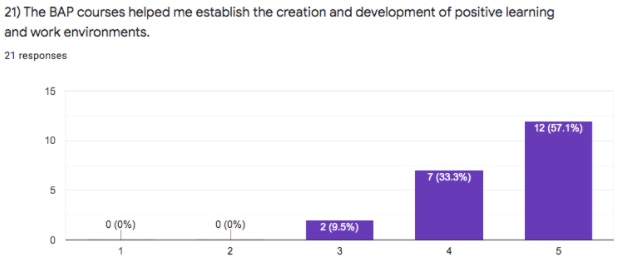AAQEP Accreditation
Standard 2 Aspect C
Standard 2c - Evidence shows that program completers create productive learning environments and use strategies to develop productive learning environments in a variety of school contexts
The Bilingual Authorization Program (BAP) selected three different measures to examine how program alumni create productive learning environments. The first measure comes from the BAP completer survey, the second measure comes from the BAP employer survey, and the third comes from the BAP alumni (1+ years) survey. Data collection for the latter two will begin during the 2021-2022 academic year, hence, there is no data to display for this report.
Data Sources & Analysis
Data Source 1
BAP Completer Survey
Description of Data Source:
The first measure for Standard 2C comes from the BAP completer survey completed by
21 graduates for the spring 2021 term. The purpose for this survey is to understand
graduates' experiences in the BAP and Multiple Subject credential program as well
as employment outcomes. Moving forward, data from this survey will be analyzed and
discussed in the program advisory committee meetings with the purpose of making the
necessary changes to improve the program and to better serve our students and the
interests of stakeholders, such as district partners.
Only one (1) year of completer data is available because this is the first time a completer survey was created and disseminated among program graduates. Prior to the new coordinator’s leadership, the BAP was a very small program and no completer data was collected.
Perspective Captured from Data Source: Program Completer
Rationale for using Data Source:
The survey provides information about the program from the perspective of program
completers who are now in the teaching profession.
Specific Elements of Data Source:
Survey Item 21: The BAP courses helped me establish the creation and development of
positive learning and work environments
Definition of Success for Each Element:
Completers are asked to rate the extent to which they agree with each statement on
a 1 (strongly disagree) to 5 (strongly agree) point Likert scale, with the programmatic
goal being a score of 4.
Displays of Analyzed Data:
Link to Full Dataset: BAP completer raw data
Interpretation of Data:
Responses indicate that 90.4% agreed or strongly agreed, and 9.5% were neutral on
this statement. These data demonstrate that BAP candidates feel that the program accomplishes
its goal of nurturing relevant application-based work experience that is meaningful
to their growth as bilingual/dual immersion teachers. This is accomplished via candidates'
collaborative coursework assignments as well as clinical practice placements where
they receive mentorship from their mentor teacher and coach and have an opportunity
to work directly with children that are bilingual.
Data Source 2
Planned BAP Employer Survey
Description of Data Source:
The BAP Employer Survey was created by the program coordinator in Spring 2021 to align with CCTC and AAQEP
standards. Prior to this point, the BAP program did not have an employer survey. Although
the survey was not administered to employers of program completers, data collection
will begin during the 2021-2022 academic year, hence, there is no data to display
for this report.
The survey includes both demographic information about the school and item that invite responders to rate the extent to which they on a scale of 1 (strongly disagree) to 5 (strongly agree).
Perspective Captured from Data Source: Employer
Rationale for using Data Source:
As a program, we understand the need to learn the perspectives of employers of our
completers about how well our program prepared them to be bilingual educators.
Specific Elements of Data Source:
Survey Item 10:
- Our district bilingual/dual immersion teachers create productive learning environments, and use strategies to develop productive learning environments in a variety of school contexts
Definition of Success for Each Element:
The programmatic goal for survey responses will be 80% agreement with each statement.
Plans for Collection & Analysis of Data:
Because this is a planned data source, there is no data to display. The survey will
be reviewed and revised by the BAP advisory committee during the 2021-2022 academic
year. Once completed, the survey will be disseminated among BAP district partners
in the spring semester. Data will be used for continuous program improvement.
Data Source 3
Planned BAP Completer (1+ years) Survey
Description of Data Source:
The BAP Completer (1+ years) Survey was created by the program coordinator in Spring 2021 to align with CCTC and AAQEP
standards. Prior to this point, the BAP program did not have a method of gathering
information from our completers once they are in the field about how well the program
prepared them. Although the survey was not administered to employers of program completers,
data collection will begin during the 2021-2022 academic year, hence, there is no
data to display for this report.
The survey will include both demographic information about the school and item that invite responders to rate the extent to which they on a scale of 1 (strongly disagree) to 5 (strongly agree).
Perspective Captured from Data Source: Completers
Rationale for using Data Source:
As a program, we understand the need to learn the perspectives of our completers about
how well the program prepared them to be bilingual educators.
Specific Elements of Data Source:
Survey Item 11:
- As a classroom teacher, I create productive learning environments, and use strategies to develop productive learning environments in a variety of school contexts
Definition of Success for Each Element:
The programmatic goal for survey responses will be 80% agreement with each statement.
Plans for Collection & Analysis of Data:
Because this is a planned data source, there is no data to display. The survey will
be reviewed and revised by the BAP advisory committee during the 2021-2022 academic
year. Once completed, the survey will be disseminated among BAP district partners
in the spring semester. Data will be used for continuous program improvement.